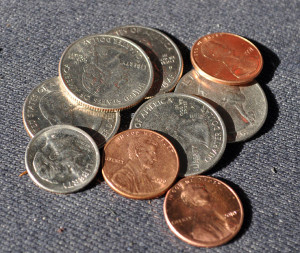There seem to be two prevailing attitudes when it comes debt: the “Bring it On!” camp, and the “Won’t Touch It With A Ten-Foot Pole” camp.
Here’s a secret: both attitudes will make you poor.
Debt: “Bring it ON!”
One camp of people are nonchalant about it. Five-year car loan? No problem. (After all, I can’t have a car that breaks down … I rely on my car to get to work … )
Home mortgage? Of course, how else are you going to buy a home!
Credit-card balance? Well, maybe a little, but there was a sale, and I need a nice suit for my job …
Debt: Won’t Touch It With A Ten Foot Pole
The other camp of people display a knee-jerk response to the horror stories they hear about others being buried up to their ears in debt. This camp of people proclaim to be allergic to debt; they can’t imagine carrying a penny of debt, and they won’t entertain the idea of it. This is the group I call the “I-won’t-touch-debt-with-a-ten-foot-pole” camp.
Guess which camp is financially responsible?
The answer might surprise you: Neither.
Consumer Debt Stinks
It’s obvious why Team Bring-It-ON! holds a dangerous attitude to money: it’s much easier to get in debt than it is to get out. But taking the opposite approach, and insisting on paying cash for everything, can be just as bad.
Let’s say you get accepted to MBA programs at two schools: State University and Harvard. State U. will let you attend on a full scholarship. Harvard will sink you into $100,000 of debt, all of which you must borrow at a 6 percent interest rate.
You opt to go to State U. When you graduate, you attend a Job Fair with your resume and meet a friendly recruiter from a pet-supply company who tells you they have an opening in their finance department. What a coincidence, your MBA is in finance. You buy a suit (in cash, which you have in abundance since your tuition, housing and food were free), drive to the interview in the car you bought with cash, and score the job. Starting salary: $80,000, with an annual 3 percent increase.
Alternatively, let’s say you opt to go to Harvard. In your advanced public policy class, you study under a professor who sits on the board of directors of a major investment bank. Your essay on Federal Reserve policy catches his eye, and he asks you to come to lunch with one of his colleagues from the bank. You attend lunch (at the Four Seasons) and insist on picking up the tab as a thank-you gesture. Every penny of this, from your haircut to the tip you give the waiter, is on borrowed money.
You graduate, and the 6 percent interest rate starts kicking in. You haven’t found a job yet, and you’re starting to worry. By the end of the year, that $100,000 you owe will turn into $106,000 — and it will keep compounding until you pay it back.
You email your professor’s colleague — with whom you ate lunch — and indicate interest in being involved in his company. He writes back to say he has no openings right now, sorry. But there’s an unpaid internship available.
You accept the unpaid internship. You have no other options. You’re beginning to regret taking out such a massive loan, sinking yourself in debt, and attending the pricier school.
Two months into the internship, you trip over a sidewalk curb, sprain your ankle, and have to go to the hospital. You bought cheap, “catastrophe-only” insurance with a $5,000 deductible, which means you’re now facing a $2,300 bill that you need to pay out-of-pocket. You’re now convinced you made a horrible decision and you should have attended State U.
You hobble back into your internship with a splint on your ankle and a sour mood. But you keep your feelings to yourself and re-double your efforts at work. You befriend some office mates and help them score a new client. You catch a glaring error on a spreadsheet before it got in front of a client and embarrassed the firm.
Your superiors are impressed by your combination of skill, dedication, and prestigious pedigree. One year after you started the internship, the man you ate lunch with — years ago, on borrowed money — calls you into his office and offers you a full-time position. Starting salary: $120,000, with the potential for bonuses ranging from $1,000 – $10,000.
Still not a hugely impressive figure … which means it sounds realistic. But let’s break down the impact of this debt:
$100,000 = student loan
$6,000 = first year interest
$2,300 = medical bills
$6,000 = second year interest, in full (didn’t pay back a dime during Year 1)
$3,000 = third year interest, in part (paid back half the loan during Year 2)
Total debt = $117,300.
Payoff = extra $40,000 per year. This means for 3 years, the “extra” salary (that extra $40,000 over what the State U. graduate earns) will go towards paying down your student debt. Every extra dollar earned after Year 3 will be net profit. If you work for 30 years after graduating, this translates to a net profit of $1.2 million.
People often believe that home mortgages are okay, but student loans should be avoided.
I believe the opposite. Your house is a lousy investment. But a student loan has the potential to provide amazing returns.
Sure, not all student loans will yield awesome returns: think carefully about your major, your career, and what types of network-building or connections you will be able to make at your school. Only you know which school makes the most sense for your course of study. But don’t pinch pennies or let your wallet be your guide. The right school is worth its cost.
